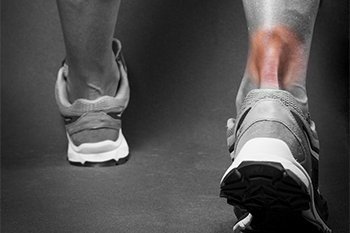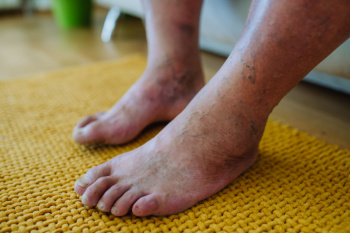
An Achilles tendon tear is a serious injury that occurs when the tendon connecting the calf muscles to the heel bone partially or completely ruptures. This can result from sudden force during sports, jumping, or running, as well as from degeneration due to overuse or aging. Common causes include increased activity without proper conditioning or underlying tendon weakness. Diagnosis is made through a physical exam, checking for swelling, bruising, tenderness, or difficulty pushing off the foot, and may include imaging tests for confirmation. A podiatrist can provide expert treatment, from immobilization and therapy to surgical referrals, when needed. If you have sustained an Achilles tendon injury, it is suggested that you promptly consult a podiatrist who can accurately diagnose and treat this condition.
Achilles tendon injuries need immediate attention to avoid future complications. If you have any concerns, contact one of our doctors of Hamilton Foot and Ankle Associates. Our doctors can provide the care you need to keep you pain-free and on your feet.
What Is the Achilles Tendon?
The Achilles tendon is a tendon that connects the lower leg muscles and calf to the heel of the foot. It is the strongest tendon in the human body and is essential for making movement possible. Because this tendon is such an integral part of the body, any injuries to it can create immense difficulties and should immediately be presented to a doctor.
What Are the Symptoms of an Achilles Tendon Injury?
There are various types of injuries that can affect the Achilles tendon. The two most common injuries are Achilles tendinitis and ruptures of the tendon.
Achilles Tendinitis Symptoms
- Inflammation
- Dull to severe pain
- Increased blood flow to the tendon
- Thickening of the tendon
Rupture Symptoms
- Extreme pain and swelling in the foot
- Total immobility
Treatment and Prevention
Achilles tendon injuries are diagnosed by a thorough physical evaluation, which can include an MRI. Treatment involves rest, physical therapy, and in some cases, surgery. However, various preventative measures can be taken to avoid these injuries, such as:
- Thorough stretching of the tendon before and after exercise
- Strengthening exercises like calf raises, squats, leg curls, leg extensions, leg raises, lunges, and leg presses
If you have any questions please feel free to contact our offices located in Brooklyn, New York, NY . We offer the newest diagnostic tools and technology to treat your foot and ankle needs.

Foot problems are a serious concern for diabetic patients, often caused by poor circulation and nerve damage, known as peripheral neuropathy. Symptoms may include tingling, burning sensations, slow-healing wounds, or unnoticed injuries due to reduced feeling in the feet. Visually, the skin may appear dry, cracked, or discolored, and ulcers or infections may develop without pain. These changes can lead to severe complications, if not properly managed. A podiatrist plays a critical role in diabetic foot care by regularly monitoring foot health, checking for signs of nerve damage, infection, or poor circulation. Treatment may include wound care, toenail care, pressure relief techniques, and guidance on proper footwear. Preventive care is essential to avoid ulcers, infections, and even loss of limb. A podiatrist also provides education on daily foot inspection and hygiene. If you have diabetes, it is suggested that you schedule an appointment with a podiatrist to ensure early detection and personalized care for diabetic foot health.
Diabetic foot care is important in preventing foot ailments such as ulcers. If you are suffering from diabetes or have any other concerns about your feet, contact one of our doctors from Hamilton Foot and Ankle Associates. Our doctors can provide the care you need to keep you pain-free and on your feet.
Diabetic Foot Care
Diabetes affects millions of people every year. The condition can damage blood vessels in many parts of the body, especially the feet. Because of this, taking care of your feet is essential if you have diabetes, and having a podiatrist help monitor your foot health is highly recommended.
The Importance of Caring for Your Feet
- Routinely inspect your feet for bruises or sores.
- Wear socks that fit your feet comfortably.
- Wear comfortable shoes that provide adequate support.
Patients with diabetes should have their doctor monitor their blood levels, as blood sugar levels play such a huge role in diabetic care. Monitoring these levels on a regular basis is highly advised.
It is always best to inform your healthcare professional of any concerns you may have regarding your feet, especially for diabetic patients. Early treatment and routine foot examinations are keys to maintaining proper health, especially because severe complications can arise if proper treatment is not applied.
If you have any questions, please feel free to contact our offices located in Brooklyn, New York, NY . We offer the newest diagnostic and treatment technologies for all your foot care needs.

Turf toe is a sprain of the big toe joint that occurs when the toe bends too far backward, stretching or tearing the soft tissues that support it. This injury commonly affects athletes who play on hard or artificial surfaces, such as football or soccer players. But this type of toe sprain can also develop in gymnasts, dancers, or wrestlers who frequently push off the front of the foot. Symptoms include pain at the base of the big toe, swelling, bruising, and stiffness, which can make walking or bending the toe difficult. The severity can range from mild overstretching to complete tearing of the ligaments around the joint. Turf toe can develop suddenly from a single forceful movement or gradually through repetitive stress on the toe. A podiatrist can diagnose turf toe, determine the extent of damage, and provide treatment options ranging from conservative care to surgery, in severe cases. If you are experiencing symptoms of turf toe, it is suggested that you schedule an appointment with a podiatrist for an exam and appropriate treatment.
Toe pain can disrupt your daily activities. If you have any concerns, contact one of our doctors of Hamilton Foot and Ankle Associates. Our doctors can provide the care you need to keep you pain-free and on your feet.
What Causes Toe Pain?
Most severe toe pain is caused due to a sports injury, trauma from dropping something heavy on the toe, or bumping into something rigid. Other problems can develop over time for various reasons.
Toe pain can be caused by one or more ailments. The most common include:
- Trauma
- Sports injury
- Wearing shoes that are too tight
- Arthritis
- Gout
- Corns and calluses
- Hammertoe
- Bunions
- Blisters
- Ingrown toenails
- Sprains
- Fractures (broken bones)
- Dislocations
When to See a Podiatrist
- Severe pain
- Persistent pain that lasts more than a week
- Signs of infection
- Continued swelling
- Pain that prevents walking
Diagnosis
In many cases the cause of toe pain is obvious, but in others, a podiatrist may want to use more advanced methods to determine the problem. These can range from simple visual inspections and sensation tests to X-rays and MRI scans. Prior medical history, family medical history, and any recent physical traumatic events will all be taken into consideration for a proper diagnosis.
Treatment
Treatments for toe pain and injuries vary and may include shoe inserts, padding, taping, medicines, injections, and in some cases, surgery. If you believe that you have broken a toe, please see a podiatrist as soon as possible.
If you have any questions please contact our offices located in Brooklyn, New York, NY . We offer the newest diagnostic and treatment technologies for all your foot and ankle needs.

